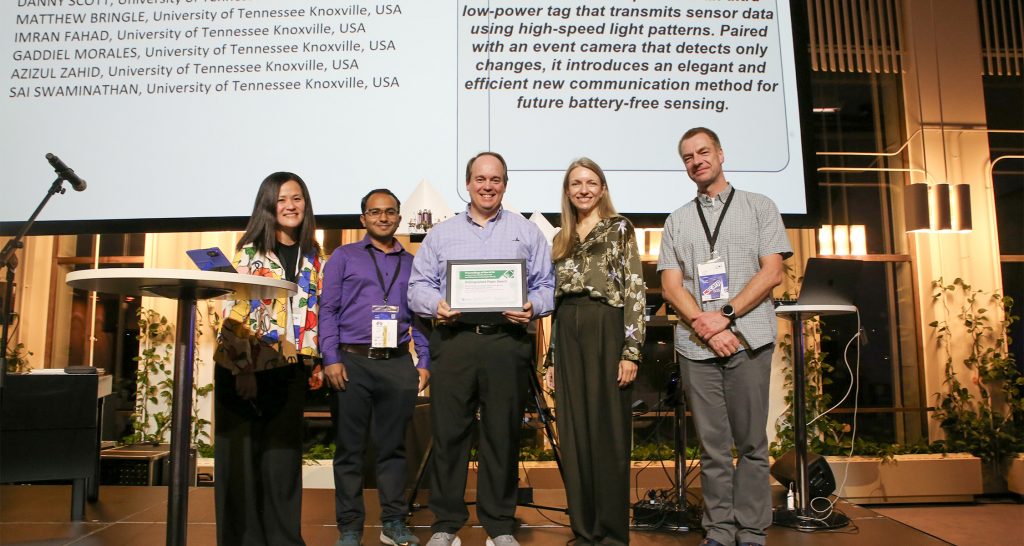Batteryless, Wireless Sensors Gain International Recognition
This October, two PhD students from the Min H. Kao Department of Electrical Engineering and Computer Science (EECS) traveled to Espoo, Finland, to receive a prestigious international paper award for work conducted in the Energy, People, Infrastructure, and Interactive Computing (EPIC) Lab led by EECS Assistant Professor Sai Swaminathan.
Over the last several years, PhD students Danny “Dan” Scott, Imran Fahad, and Azizul Zahid; graduate alum Gaddiel Morales (EECS MS ’24); and undergraduate alum Matthew Bringle (EECS BS ’25) have been working to create batteryless sensors that can detect a variety of stimuli in complex environments.
The resulting NeuroCamTags are not only powered by ambient light but also use quick flashes of light to wirelessly transmit data.
“This is the first system that combines light-based power and light transmission with event-camera receivers, which only activate when something changes,” Swaminathan explained. “That allows NeuroCamTags to run at extremely low power and points to what future batteryless wireless sensing systems could look like.”
Last year, the team published their work on NeuroCamTags in Volume 8 of the Proceedings of the Association for Computing Machinery (ACM) on Interactive, Mobile, Wearable and Ubiquitous Technologies (IMWUT), a journal series focused on embedded computing technology.

Each year, the IMWUT Editorial Board honors the most outstanding papers published in the journal with Distinguished Paper Awards (DPAs), recognizing them as “exemplary contributions to (the IMWUT) research community.”
Out of 200 publications in Volume 8, the NeuroCamTags paper is one of just eight to receive the honor.
“I am proud of the persistence and collaboration that went into such a challenging project and grateful for the dedicated team that made it possible,” said Scott, the paper’s first author. “This recognition reinforced my confidence in leading complex research and reminded me that our work contributes to a broader conversation about sustainability and intelligent sensing on a global scale.”
Scott and Fahad represented their team in receiving the DPA at the ACM international joint conference on Pervasive and Ubiquitous Computing (UbiComp) and International Symposium on Wearable Computing (ISWC). UbiComp/ISWC 2025 was held at Aalto University in Espoo, Finland, from October 14-16.
“My favorite part of the conference was meeting researchers from many countries and learning about their diverse work,” said Fahad. “I also had the chance to present another of our papers on long-range, batteryless sensors and received valuable feedback from other researchers. After the presentation, several expressed interest in potential collaborations, which was very encouraging.”
Lightweight, Light-Powered Sensors
There are many potential benefits to networks of interconnected devices, known as the Internet of Things (IoT). However, broad networks used to monitor activity in factories or other complex environments can require hundreds of tags, so using disposable batteries in such devices would create enormous environmental and maintenance costs.
That is why one of the EPIC Lab’s main goals is developing energy-efficient, batteryless sensing systems that incorporate ultra-low-power artificial intelligence (AI) and wireless communication capabilities.
Each NeuroCamTag is capable of detecting contact, button or key presses, sound cues, and temperature changes up to 200 feet away. Each sensor’s event-camera receiver is paired with onboard AI to help the sensors respond only to meaningful changes, keeping energy needs low.
The tags also operate entirely using energy harvested from indoor lighting and communicate using light-based signals, further reducing energy consumption while also enabling the use of sensors in environments with high radio usage, like hospitals.
“With this study, we aimed to demonstrate that intelligent sensing systems can run entirely on harvested energy sources, reducing waste and enabling long-term, maintenance-free operation,” Scott said. “Ideally, we want to deploy many batteryless sensors throughout everyday environments to detect and understand human activity in a sustainable way.”
Contact
Izzie Gall (egall4@utk.edu)
